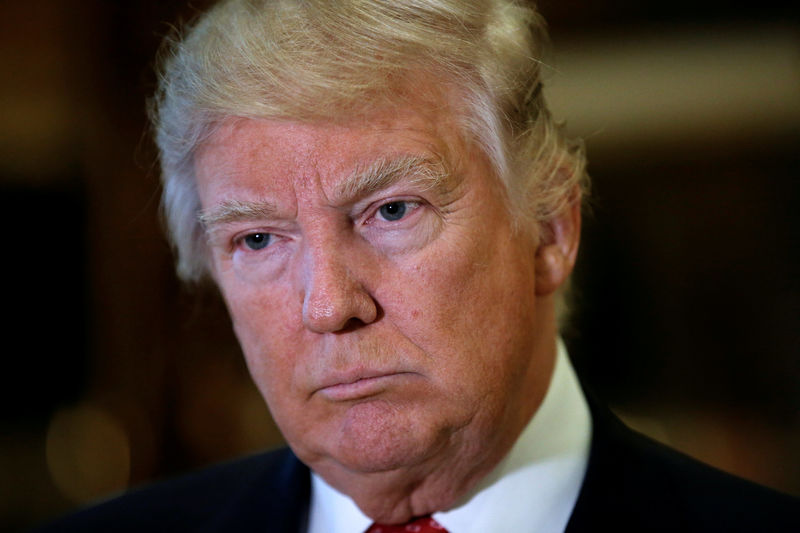By Ben Blanchard and Steve Holland
BEIJING/WASHINGTON (Reuters) - U.S. President Donald Trump changed tack and agreed to honor the "one China" policy during a phone call with China's leader Xi Jinping, a major diplomatic boost for Beijing which brooks no criticism of its claim to self-ruled Taiwan.
Trump angered Beijing in December by talking to the president of Taiwan and saying the United States did not have to stick to the policy, under which Washington acknowledges the Chinese position that there is only one China and Taiwan is part of it.
A White House statement said Trump and Chinese President Xi had a lengthy phone conversation on Thursday night, Washington time.
"President Trump agreed, at the request of President Xi, to honor our 'one China' policy," the statement said.
A spokesman for Taiwan President Tsai Ing-wen said in a statement it was in Taiwan's interest to maintain good relations with the United States and China.
The U.S. and Chinese leaders had not spoken by telephone since Trump took office on Jan. 20. Diplomatic sources in Beijing say China had been nervous about Xi being left humiliated in the event a call with Trump went wrong and the details were leaked to the media.
Last week, U.S. ties with staunch ally Australia became strained after the Washington Post published details about an acrimonious phone call between Trump and Prime Minister Malcolm Turnbull.
No issue is more sensitive to Beijing than Taiwan. China and the United States also signaled that with the "one China" issue resolved, they could have more normal relations.
"Representatives of the United States and China will engage in discussions and negotiations on various issues of mutual interest," the statement said.
In a separate statement carried by China's Foreign Ministry, Xi said China appreciated Trump's upholding of the "one China" policy.
"I believe that the United States and China are cooperative partners, and through joint efforts we can push bilateral relations to a historic new high," the statement quoted Xi as saying.
"The development of China and the United States absolutely can complement each other and advance together. Both sides absolutely can become very good cooperative partners," Xi said.
Taiwan's top China policymaker, the Mainland Affairs Council, said it hoped for continued support from the United States and called on Beijing to adopt a "positive attitude" and "pragmatic communication" in resolving differences with Taiwan.
China is deeply suspicious of Tsai, whose ruling Democratic Progressive Party espouses the island's formal independence, a red line for Beijing, and has cut off a formal dialogue mechanism with the island. Tsai says she wants peace with China.
In Beijing, Chinese Foreign Ministry spokesman Lu Kang said the "one China" principle was the political basis of Sino-U.S. ties.
"Ensuring this political basis does not waver is vital for the healthy, stable development of China-U.S. relations," Lu said.
"PAPER TIGER"
Lawyer James Zimmerman, the former head of the American Chamber of Commerce in China, said Trump should have never raised the "one China" policy in the first place.
"There is certainly a way of negotiating with the Chinese, but threats concerning fundamental, core interests are counterproductive from the get-go," he said in an email.
"The end result is that Trump just confirmed to the world that he is a paper tiger, a 'zhilaohu' – someone that seems threatening but is wholly ineffectual and unable to stomach a challenge."
Jia Qingguo, dean of the School of International Studies at Peking University and who has advised the government on foreign policy, said Trump had created a lot of uncertainty but was now back on track.
"Trump has reassured people that he will be a responsible president," he told Reuters. "...This is good news for China, because stable U.S.-China relations are good for China. Now we can do business."
The United States switched diplomatic recognition from Taiwan to China in 1979, but is also Taiwan's biggest ally and arms supplier and is bound by legislation to provide the means to help the island defend itself.
Defeated Nationalist forces fled from China to Taiwan in 1949 after losing a civil war with the Communists. Beijing has never renounced the use of force to bring Taiwan under its control.
"EXTREMELY CORDIAL"
China wants cooperation with the United States on trade, investment, technology, energy and infrastructure, as well as strengthening coordination on international matters to jointly protect global peace and stability, Xi said in the statement.
The White House described the call, which came hours before Trump plays host to Japanese Prime Minister Shinzo Abe, as "extremely cordial", with both leaders expressing best wishes to their peoples.
There was little or no mention in either the Chinese or U.S. statement of other contentious issues - trade and the disputed South China Sea - and neither matter has gone away.
A U.S. official told Reuters on Thursday that a U.S. Navy P-3 plane and a Chinese military aircraft came close to each other over the South China Sea, though the Navy believes the incident was inadvertent.

China on Friday reported an initial trade surplus of $51.35 billion for January, more than $21 billion of which was with the United States.